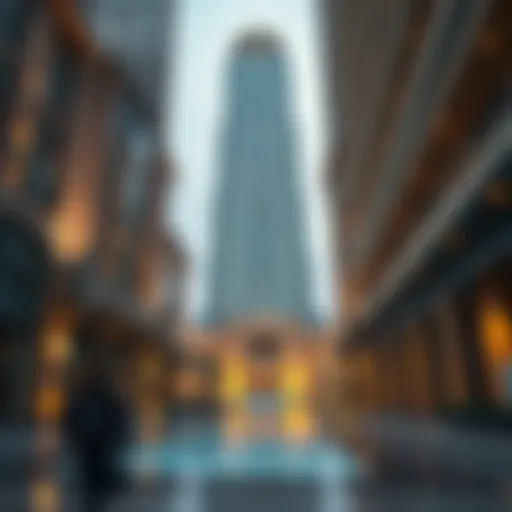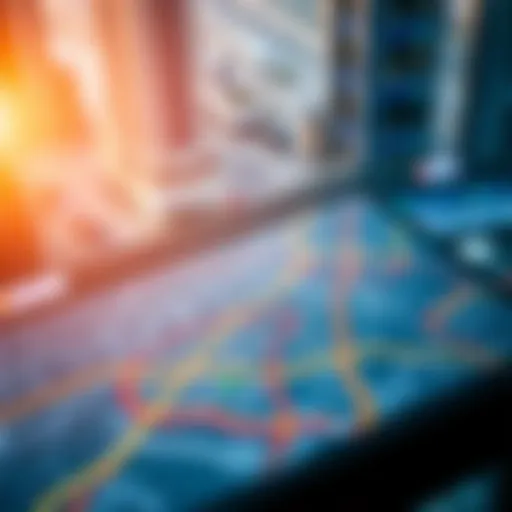Understanding Iftar Timing in Dubai: A Comprehensive Guide
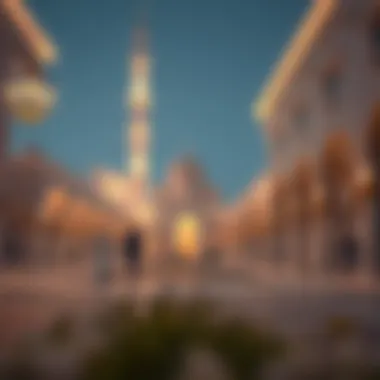

Intro
Delving into the rhythms of life during Ramadan in Dubai, one cannot overlook the significance of iftar timings. The breaking of fast, known as iftar, is not merely a meal; it's a sacred ritual steeped in tradition and community spirit. As the sun dips below the horizon, families and friends gather, reflecting on the day's fast. In Dubai, the timing of iftar can vary widely based on geographical position, local customs, and the season.
As the holy month approaches, many wonder how these timings are set and why they differ from one area to another. Understanding these nuances helps both residents and visitors engage deeply with the cultural fabric of Ramadan, enhancing their experience.
In this comprehensive guide, we will navigate through the historical background of Ramadan in Dubai, explore the cultural practices surrounding iftar, and examine current trends that affect the timing of this important meal. We will also discuss how technology aids individuals in finding precise iftar timings and how this contributes to stronger community ties. This exploration serves not just to inform, but to inspire those aiming to understand and participate in Ramadan festivities with respect and reverence.
Prolusion to Iftar in Dubai
Iftar is much more than just a meal to break the fast during Ramadan; it embodies the essence of togetherness and spirituality that defines this holy month in Dubai. As the sun dips below the horizon, the sound of the adhan reverberates throughout the city, signaling the welcomed moment when families and friends gather to share in the breaking of their fast. This article delves into the significance of iftar in Dubai, outlining its cultural importance and the various elements that make this practice unique in the emirate.
Understanding iftar timing is crucial for several reasons. Firstly, accurate timing helps practitioners align their spiritual objectives with their daily life, ensuring they adhere to the traditions of Ramadan without compromising their responsibilities. Secondly, it fosters community bonds, as the timing often coincides with communal gatherings or events aimed at enhancing the sense of belonging among observers. Moreover, by grasping the nuances of iftar, readers will gain insights into not only their religious practices but also the cultural intricacies of Dubai.
As we navigate the various aspects of iftar— from its definition to its significance within the broader context of Ramadan— this guide will serve as an invaluable resource, illuminating the importance this tradition holds in Dubai and how it shapes the collective identity of its people.
Defining Iftar
Iftar originates from the Arabic root word “fatar,” which means to break fast. It marks the end of a day of fasting, a practice that Muslims partake in during the holy month of Ramadan, beginning right before dawn and continuing until sunset. The traditional iftar meal often starts with dates and water, a method that follows the Sunnah— the teachings of the Prophet Muhammad. Following this initial sustenance, various culinary delights emerge, reflecting local flavors and preferences.
In Dubai, iftar meals may feature an extensive array of dishes, from rich stews and grilled meats to exquisite desserts like knafeh, capturing the region’s diverse culinary traditions. The inclusion of these local delicacies plays a crucial role in the community aspect of iftar, as families often share meals or invite neighbors, reinforcing the bonds of friendship and kinship.
The Significance of Iftar During Ramadan
Iftar is not merely a time for physical nourishment; it serves as a profound moment for reflection, gratitude, and community bonding. This breaking of fast symbolizes renewal and the importance of patience and self-discipline— virtues that Ramadan upholds. Observers look forward to this time as it honors the act of self-denial and encourages spiritual growth.
The communal aspect of iftar further enhances its significance. Public iftar gatherings often take place in parks or community centers, bringing together people from different backgrounds, creating an atmosphere of inclusivity and respect. It’s during these moments that many share their experiences, stories, and faith.
Moreover, the timing of iftar is also seen as an invitation to pause in one’s busy day. As individuals take the time to adjust their schedules to accommodate this sacred tradition, they cultivate mindfulness and reflection. Engaging in communal prayers before or after iftar before the evening meal strengthens the connections felt within the community.
Ultimately, the significance of iftar during Ramadan transcends mere ritualistic adherence; it fosters a sense of harmony, appreciation, and shared identity among all participants, making it an integral part of life in Dubai.
Cultural Aspects of Iftar in Dubai
The cultural significance of iftar in Dubai goes far beyond the mere act of breaking a fast; it’s a reflection of a deeply intertwined social fabric and heritage that has evolved over centuries. Iftar serves as a communal experience, fostering bonding not just within families but also among friends, neighbors, and the larger society. As the sun dips below the horizon during Ramadan, the air fills with the fragrant scents of traditional foods, inviting everyone to partake in a sacred tradition that promotes unity, gratitude, and the sharing of blessings.
Historical Context of Ramadan Traditions
Ramadan in Dubai, like many places across the Muslim world, is rich with history. It’s not merely a month of fasting; it has roots that trace back to the early days of Islam. In the bustling markets and narrow lanes of Old Dubai, one can almost hear echoes of past Ramadan celebrations — vibrant gatherings lit by lanterns, where families and friends would share food and laughter. Historical accounts hint that even in the early 20th century, the timing of iftar was crucial to community life.
With the advancement of technology, many customs have remained, though some transition has occurred. While traditional markets (souks) still provide fresh dates and specialty dishes, the modern landscape brings a blend of old and new, creating a tapestry of practices synonymous with the spirit of Ramadan. Today, it is common to see iftar tents set up across various neighborhoods, fostering community gathering under beautifully decorated canvases, highlighting the essence of sharing and hospitality.
Local Customs and Community Practices
In Dubai, iftar transcends simply being a meal. Customs vary, yet they revolve around the same core values of generosity and togetherness. For instance, many families prepare larger meals than usual, not only for themselves but also to share with neighbors or donate to those in need.
- Majlis Gatherings: Traditionally, men often gather in a majlis for iftar, sharing stories and discussing local news, solidifying bonds within the community. This is a value rooted in the tradition of hospitality.
- Volunteer Efforts: Various organizations step up during Ramadan, organizing collective meals for thousands of people, highlighting the spirit of giving. Initiatives like "Iftar Donation projects" provide meals to the less fortunate, ensuring that everyone gets to partake in iftar.
- Cultural Events: Throughout the month, diverse cultural events flourish, showcasing local art, music, and food. These events often welcome people of all backgrounds, creating avenues for intercultural exchanges and understanding.
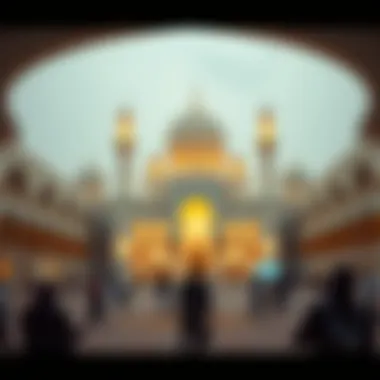

Culinary Delights at Iftar
The culinary scene during iftar in Dubai is a feast for the senses. Traditional dishes often take center stage, serving as comfort food reminiscent of home. Popular items include:
- Dates: A staple to break the fast, served plain or stuffed.
- Samosas: Crispy, savory pastries filled with meat or vegetables.
- Luqaimat: Sweet dumplings drizzled with date syrup, offering a delightful ending to the meal.
As people savor these dishes, the conversation flows easily, often surrounding culinary secrets passed down through generations. Restaurants offer exclusive iftar menus, and many even put a contemporary spin on traditional dishes. This blend of flavors and preparations showcases the gastronomic diversity that Dubai boasts, allowing iftar to be a delightful culinary journey.
Iftar in Dubai thus encapsulates far more than a meal; it’s an amalgamation of history, community, and culture that thrives during Ramadan. It reflects the city's vibrant character, all while underscoring the values of generosity, unity, and a shared sense of belonging.
"In the end, iftar is not just about food — it's about coming together to reconnect with oneself, one’s family, and the community around them."
For further exploration of Ramadan traditions, one might find insight through resources like Wikipedia, Britannica, or local community pages on Facebook.
Factors Influencing Iftar Timing
Understanding the timing of iftar is essential for anyone observing Ramadan in Dubai. It’s not merely about when to break your fast, but it intertwines with deep-rooted beliefs, astronomical observations, and cultural relevance. With so many elements at play, it's worth examining what specifically influences these crucial moments in the holy month.
Religious Observances and Moon Sighting
In Islamic tradition, iftar timing is closely linked to the sighting of the moon. The Islamic calendar is lunar, and therefore, the beginning of Ramadan is determined by the appearance of the crescent moon. This nuanced observation makes the iftar schedule fluid and a bit unpredictable. Local mosques gather communities to witness the moon, creating a palpable sense of anticipation and unity among individuals.
Many people rely on their local religious leaders for precise timings, and these can vary slightly from one community to another due to different moon sightings. This practice highlights how deeply religious observance impacts daily life during Ramadan.
"The month of Ramadan is not just a countdown – it’s a period of spirituality and collective faith."
The exact minute that the maghrib call to prayer resonates through the streets marks the official start of iftar. It's a time that symbolizes breaking not just fasts, but also barriers, as communities gather to share a meal together.
Seasonal Variations in Sunset Times
Dubai experiences significant variation in sunset times throughout the year, and Ramadan often shifts based on the lunar calendar, cycling through different seasons. This phenomenon impacts iftar times dramatically.
For example, if Ramadan falls in the summer months, the sun sets later, potentially extending the fasting period to as long as 14 to 15 hours. On the flip side, iftar during winter months can occur earlier, sometimes allowing fasts of just 12 hours.
These changes mean that individuals must stay updated on local Islamic authorities or community announcements to know the exact iftar time for each day. This variability can guide one’s daily planning and dining preparations, emphasizing the necessity for adaptability during Ramadan.
Impact of Geography on Timing
The geographical position of Dubai plays a substantial role in determining iftar timings. Situated close to the equator, Dubai experiences relatively consistent daylight hours throughout the year, but even minor shifts can have notable effects on prayer and eating schedules. The latitude and longitude influence not only sunset but also twilight durations.
In practical terms, this means that someone living in Dubai might be breaking their fast at a different time than someone in a location further north, such as in London. In contrast, residing in cities at varying latitudes tells you that the observances can be unique, necessitating local insights for accuracy.
Understanding these geographic distinctions allows individuals to anticipate changes in daily routines during Ramadan, fostering a deeper connection with both their spirituality and community engagement during this sacred time.
In summary, factors influencing iftar timing extend beyond a mere clock reading; they echo the very pulse of community, faith, and cooperation among all who participate in this cherished observance.
Understanding Local Iftar Timing
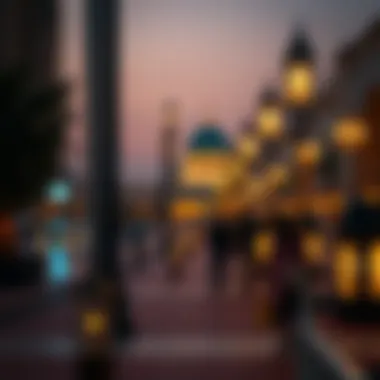

Understanding the timing of iftar in Dubai is more than just checking a clock. It delves into a rich fabric of culture, spirituality, and community ties that bind the residents together, especially during the holy month of Ramadan. Observing the fast culminates in this moment when the sun sets, marking a significant emotional and spiritual milestone. This understanding captures not only the need for precise timing but also highlights the collective anticipation and patience witnessed among friends, family, and community members as they await the evening meal.
How to Determine Iftar Times
Determining when to break the fast is crucial, and in Dubai, this relies on a combination of religious guidelines and practical tools. The most fundamental way to establish iftar timing is through the daily prayer schedule, as iftar coincides with the Maghrib prayer, which occurs just after sunset.
- Sunset Timing: Observers can look up local sunset times using various resources such as Islamic apps or websites that provide prayer times based on geographic location. For example, sites like IslamicFinder offer real-time updates based on your location.
- Mosques Announcements: Many mosques in Dubai broadcast iftar timings over loudspeakers, providing clear and syncronized information for the community.
- Community Boards: Local religious centers often display the daily timings for iftar to help everyone stay in sync.
It’s worth noting that iftar times might vary slightly across different areas in Dubai, primarily due to geographical factors and local community practices.
Role of Technology in Tracking Iftar Times
In this digital age, technology plays a vital role in assisting individuals in tracking iftar times accurately. With the advent of mobile apps, maintaining a connection with the community while ensuring one breaks the fast at the correct time has become simpler.
- Mobile Applications: There are numerous applications tailored for Muslims, such as "Muslim Pro" and "Al-Moazin" which not only provide prayer times but also notify users of sunset and iftar timings with old-school reliability.
- Social Media: Platforms like Facebook and Twitter see community groups that regularly post iftar timings, fostering a sense of togetherness online.
- GPS-based Services: Using GPS technology, certain apps can customize iftar notifications based on an individual’s current location, ensuring no one misses this important moment.
Using Local Community Resources
The local community is a treasure trove of resources when it comes to understanding iftar timings. Engaging with community hubs is invaluable, as they often serve as the backbone of cultural practices during Ramadan.
- Community Centers: Many neighborhoods feature community centers where locals gather for iftar; these places provide not just meals but also the right timing for breaking the fast. Checking in with your nearest center can provide additional insights on timings.
- Cultural Events: Attending events or lectures about Ramadan hosted by various organizations can deepen one's understanding of local practices, including the timing of iftar.
- Word of Mouth: Sometimes, just chatting with neighbors can provide accurate iftar timings, as this tradition of sharing knowledge is a significant aspect of the community spirit.
"Timing is everything in life, but during Ramadan, it takes on a whole new level of meaning."
By embracing both technology and community knowledge, individuals can navigate the complexities of iftar timings with ease, making their experience during Ramadan in Dubai spiritually enriching and more cohesive in nature.
Practical Considerations for Observers
Observing Iftar in Dubai is more than just a time to eat; it’s steeped in community, tradition, and spirituality. As the sun slips below the horizon, the breaking of the fast becomes a moment to reconnect with family and friends, as well as a time for introspection. Therefore, understanding the practical aspects of this ritual can enhance the overall experience for both devotees and newcomers alike.
Adjusting Schedules for Iftar
For those participating in Iftar, adjusting daily schedules may become necessary. The sunset timings during Ramadan fluctuate, impacting when to stop daily activities and prepare for the meal. It's essential to keep this in mind, especially for those managing work or family obligations.
- Setting Alerts: Utilize smartphone apps or online resources to get accurate timings. Many apps can send notifications when it’s time for Iftar, ensuring you don’t miss the moment.
- Plan Your Day: Communicate with family and friends to plan joint activities around Iftar. For example, wrapping up work an hour before sunset can help gear up for a relaxed evening.
- Flexibility: Be willing to adapt your plans. If a meal is planned at a restaurant, first check if their Iftar menu is aligned with the sunset schedule.
Planning Community Gatherings
Gathering with others for Iftar can foster a sense of belonging and deepen community ties. However, planning these gatherings requires careful thought regarding timing and logistics:
- Choose a Central Location: If inviting over friends or family, pick a location convenient for everyone. This can avoid any last-minute rush and ensure that guests arrive on time.
- Communicate Early: Send invitations well in advance, noting the exact Iftar timing. This allows guests to allocate their schedules accordingly, giving them the opportunity to participate fully.
- Special Dietary Needs: It’s wise to consider any dietary restrictions among your guests. Arrange for a diverse menu that accommodates different palates and health requirements.
Navigating Restaurant Offerings for Iftar
Dubai is known for its vibrant culinary scene, especially during Ramadan. Many restaurants offer unique Iftar menus, but making the best choice requires some savvy:
- Research Options: Explore various restaurants online beforehand. Websites like Zomato and TripAdvisor can provide insight into customer reviews and special offers for Iftar.
- Reservations: Given the popularity of Iftar dining, it’s prudent to make reservations ahead of time. A reservation ensures seating availability and helps manage your group comfortably.
- Compare Menus: Look for restaurants that provide traditional dishes alongside modern takes to satisfy varying tastes. Understanding what’s available can help you enjoy a fulfilling meal that truly embodies Ramadan's spirit.
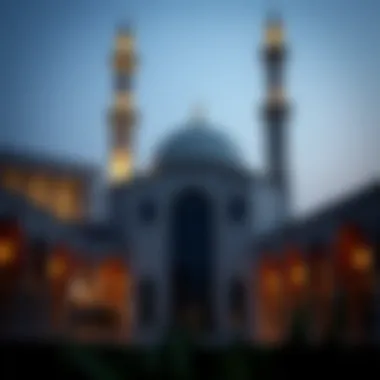

Gathering for Iftar isn't just about food; it’s about sharing experiences and creating memories that last a lifetime.
The observance of Iftar bears rich communal value, underscoring the importance of adjusting schedules, planning effective gatherings, and navigating options when dining out. What may seem like mere logistics are, in fact, building blocks to a profound experience within the camaraderie of Dubai's diverse societal fabric.
Community Engagement During Iftar
Community engagement during Iftar transcends the simple contemplation of timing; it forms the very heart of Ramadan in Dubai. As the sun dips below the horizon, marking the end of the daily fast, neighborhoods come alive. This is more than a communal meal; it’s an opportunity for unity, sharing, and reflection. Families and friends gather to break their fast with traditional dishes, yet the real magic happens when these gatherings extend beyond the familial ties into wider community practices.
Engagement in Iftar activities fosters a spirit of togetherness and creates a social fabric that strengthens ties among diverse groups—whether they are locals or expatriates. Taking part in these moments is also about honoring the shared values of compassion and generosity that are central to Ramadan. Additionally, it serves as a reminder of the vital role community plays in one's life, especially during this holy month.
Volunteering Opportunities
Volunteering during Iftar offers numerous benefits beyond just fulfilling religious duties. Various organizations in Dubai, such as the Emirates Red Crescent, actively seek volunteers to help prepare and distribute meals to those in need. This act of giving transforms the essence of Iftar into a larger social responsibility.
People can become involved in numerous activities:
- Meal Preparation: Many community kitchens rely on volunteers to help cook and portion meals.
- Distribution: Whether it’s delivering iftar meals to remote areas or organizing events to gather and serve the community, volunteers play a pivotal role.
- Fundraising: Some initiatives require financial support to supply food, so volunteers often assist in fundraiser planning.
In addition, these volunteering experiences foster a sense of belonging and purpose, inviting individuals to become part of something greater than themselves. When someone helps others, they not only enrich their own spiritual journey but also contribute to the communal narrative that Ramadan weaves.
Cultural Events and Celebrations
Cultural events during Iftar are more than just feasting; they are a platform to showcase the rich tapestry of traditions that define Dubai. From events that highlight traditional Emirati music and dance to gatherings that discuss the significance of Ramadan, these celebrations play an essential role in cultural preservation and appreciation.
Some notable events include:
- Iftar Festivals: These are organized in public squares and parks and often feature food stalls and entertainment.
- Art Exhibits: Local artists display works inspired by Ramadan, bridging the gap between traditional and contemporary expressions of culture.
- Interfaith Dialogues: Many organizations host discussions that promote understanding and respect among religious communities, opening avenues for deeper engagement.
Engagement in such events allows for learning beyond the table. People immerse themselves in stories from various backgrounds, fostering mutual respect and appreciation. As participants share meals, they also share narratives that unite rather than divide.
Community engagement during Iftar serves as a reminder that while we break bread together, we’re also stitching a quilt of solidarity, unity, and understanding that lasts well beyond Ramadan.
In the grand tapestry of and the holy month, these moments enhance the overall experience of Iftar, making them not just meals, but celebrations of life, faith, and community.
Finale
In wrapping up the exploration of Iftar timing in Dubai, it becomes clear how this seemingly simple act transcends mere eating. It's a conduit for spiritual reflection, community connection, and cultural celebration. Each evening at sunset, as the call to prayer resonates, the vibrancy of the city shifts, as families and strangers alike gather to break their fast, marking a pause in their daily grind.
The importance of accurate Iftar timing cannot be overstated. It is not just about fulfilling a religious obligation but also about ensuring that everyone shares in the experience harmoniously. Adhering to the right time enhances the collective spirit that characterizes Ramadan. It reinforces the sense of unity among those observing the fast—whether one is participating in traditional ways at home or at community gatherings in public spaces.
Moreover, understanding the factors that influence Iftar timing—from geographic considerations to local customs—enriches an individual's connection to not just the practice itself but also to the larger tapestry of Dubai's diverse community. This local understanding helps both residents and visitors navigate through the cultural landscape with more respect and insight.
Recap of Key Points
To summarize the focal points discussed:
- Iftar is a significant event that marks the daily breaking of the fast during Ramadan, celebrated with communal and familial ties.
- Traditional practices influence the rich customs surrounding Iftar, from the meals served to the gathering places.
- Iftar timing is determined by various factors: moon sightings, seasonal variations in sunset, and local geography play a pivotal role.
- Modern technology efficiently tracks exact Iftar times, while community resources enhance awareness and participation.
- Engagement through volunteering and cultural events furthers community spirit during this holy month.
Encouraging Respect and Understanding
To foster a peaceful coexistence, it's essential to encourage respect and understanding around Iftar practices. This holy month is an opportunity for engagement, where individuals from all walks of life can join in the festivities, regardless of their backgrounds. Visitors to Dubai during Ramadan should approach these practices with an open heart and a willingness to learn.
Engaging with those around you—whether that's joining a communal meal or simply observing the rituals—can enhance mutual respect and understanding. Being mindful of others and participating in celebrations, while also respecting the sacredness of the occasion, contributes to creating a harmonious atmosphere. Maintaining this respect not only enriches individual experiences but also nurtures a spirit of unity and compassion that is vital during this special time of year.
As the sun sets each evening, let Iftar serve as a reminder of community, reflection, and gratitude, enveloping all of Dubai in warmth and connection.



